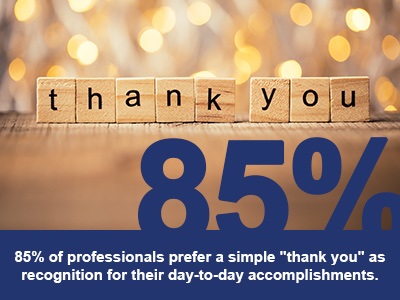A recent survey by Deloitte shows that 85% of professionals prefer a simple "thank you" as recognition for their day-to-day accomplishments. While we likely all agree that recognizing others for their work is a positive thing, people differ in "how" they want to be recognized, "for what" and "by whom."
36% of women would prefer you make the extra effort and put that in writing. Interestingly, most people prefer recognition that is either shared with a few people or delivered privately, rather than widely shared.
When it comes to recognizing others, like many things at work, one size doesn't fit all — and surprisingly, very few people want recognition that's widely shared. This was confirmed by Deloitte Greenhouse® Experience Group in their survey of 16,000 professionals, across a variety of industries, from C-suite leaders to junior staff. As part of the research, they explored the varying preferences of different “Business Chemistry” types to help identify practical strategies for creating stronger working relationships with them, both individually and on a team. There are four primary Business Chemistry types, each with unique perspectives and strengths. They include:
Pioneer — Say "thank you" and offer them a chance to try something new. Prioritize recognizing them when they've been part of a big win. For an extra boost, ask their colleagues or the boss's boss to deliver the thanks, and consider who else should hear the news.
Guardian — Inquire about whether they'd welcome a new opportunity and maybe consider a financial reward. Make sure to thank them, not only when they're part of a big success, but also when you see them making a strong and steady effort, or when their expertise adds particular value. If you're their boss, go ahead and recognize them yourself, or invite leadership to share in delivering kudos. And it's probably okay to keep it a bit quiet — they don't necessarily need (or want) their name in lights.
Driver — Present them with a challenging opportunity and thank them, particularly when they've been successful in their endeavors, but also when their expertise proves critical. If you can get the higher ups to acknowledge their performance, even better.
Integrator — Thank them sincerely and ask if they'd like a growth opportunity. Acknowledge their efforts as much as their successes, and while you're at it, recognize their commitment to living your organization's values. If they report to you directly, they'll likely appreciate you doing the recognizing yourself, or you could get their colleagues in on the effort, but there's probably no need to share your appreciation beyond a small group.
There is a strong preference for a simple thank you, across all organizational levels, generations, genders, and Business Chemistry types. Simply saying "thank you" for their everyday efforts can satisfy most of the people you work with, and for more than half of them that "thank you" can be verbal. These preferences represent a tremendous opportunity to make the people you work with feel appreciated. Saying "thank you" doesn't need to cost anything, and recognitions that have a price tag attached, like celebrations and gifts, actually rank behind a simple "thank you."
Leaders, managers, and professionals at all levels should pay attention to individual preferences when it comes to recognizing people's contributions. Most often, a simple “thank you” will suffice and can go a long way in keeping employees engaged and feeling valued.
Source: Deloitte